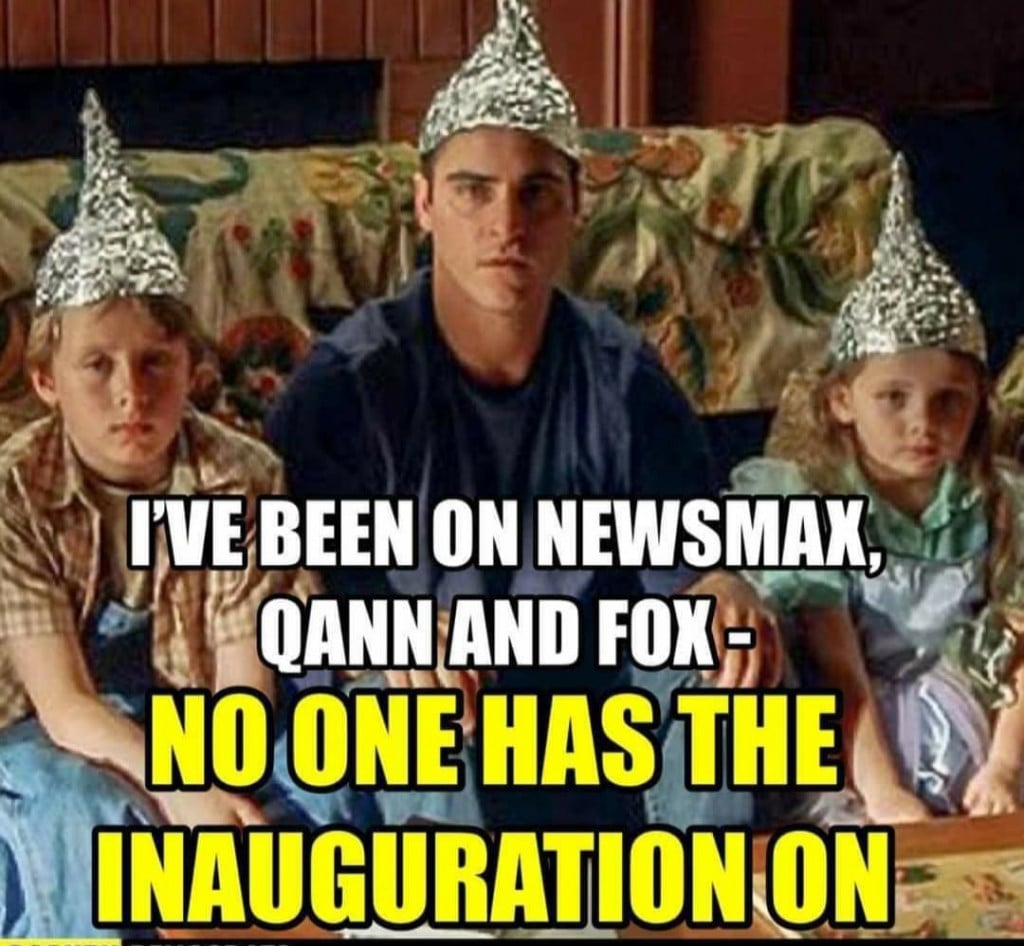Trump, The Republicans, And The QAnon Conspiracy
I have probably read less and know less about the QAnon conspiracy than most folks.
But . . . it is my impression that it is basically that the U.S., (the world?), is run by a cabal of Satin worshippers that drink the blood of babies, are pedophiles, and control every aspect of our government.
I have seen many QAnon attributions placed at Pres. Trump's doorstep because he did not just outright disown QAnon believers. And that the Republican Party is now the party of Trump and QAnon conspiracy believers.
I have some contrary thoughts on that. Not because I think I know better than others, but because I think that broad focus is misdirected. Be forewarned, I am only speaking from gut perceptions, not researched knowledge.
I think the majority of QAnon believers that are Trump supporters, or Republicans, are believers in the part of QAnon relative to a cabal of elites controlling our government. I don't believe they are true believers of the Satin-worshipping baby-blood drinking pedophile aspects of the QAnon conspiracy.
I also think that those latter, most ridiculous parts of the QAnon conspiracy theory are promotions of the Left. Of course, original sources for those claims can be found, but, can validation of those original sources be found in current QAnon believers? I don't think so. I think that if some survey of those conspiracy believers could be found it would reveal that their true beliefs are in the elite cabal parts of the conspiracy.
Maybe I am just too naive to believe anyone could believe that pedophile baby-blood stuff. What do you think?
GAhttps://www.npr.org/2020/12/30/95109564 … y-theories
A group of Satan-worshipping elites who run a child sex ring are trying to control our politics and media
True 17%
Don't know 37%
Not true 47%
Scary, huh?Yes, it is scary. But it was a relief to see that only 17% believed the whole thing.
Further down the article, they asked the "deep state" question that I was attributing to much of the acceptance of the QAnon thing. 39% believe there is a deep state.
GAThat not quite half know it's "not true" is what scares me. That's half the country that either believe it's true or don't know.
And, what constitutes "the fringe"? To me, 17% is far more than fringe.If you look at the PEW link tsmog provided you will see that 17% is of 23% of adults, not all adults. I think that does get closer to an acceptable fringe category.
Also, the PEW research has some info that relates to your concern about those that don't know. (take a look at its "news source" questions and determinations), I don't think one can honestly answer if they believe something is true or not if they don't know anything about what they are being asked about.
GA
I agree with the second to last paragraph pretty much. The ludicrous components that left leaning media emphasized did just what it was suppose to do. It grabbed the reader/viewer's attention. Yet, they are a social media phenomena within social media outlets (4chan, 8chan, 8kun, grab, etc) and their threads where Qanons read religiously. They see it as truth while looking for the mysterious Drops from Q himself.
I think the main emphasis Q created was a fear in the deep state while laying it at the feet of the Democrats. And, that Trump was/is going to be their savior and lead them to its downfall. Thus, the strong allegiance to Trump.
As far as the impact of it on the public and Republicans there are plenty of surveys that can be discovered on Google giving some degree of credence. For Republicans they range from 7% to 56%. Yet, they are pre-election. They won't show the impact of Trump's loss or not being inaugurated on March 4.
One was done by Pew Research March 2020, QAnon’s conspiracy theories have seeped into U.S. politics, but most don’t know what it is. I think they are pretty credible.
Another very interesting article showing its growth with a graph by The Conversation rated left lean, but high on factual ran Jan 7 is at the following link.
Qanon and the Storm . . .Thanks for the links tsmog. The Pew study was most reassuring. If it is reliable it indicates that the numbers PrettyPanther's linked study presented did not represent numbers of all Americans but of less than one-quarter of Americans. 17% of 23% is a lot less worrying than 17% of 100%.
It had a second point that seemed to confirm what many here say—it is the media source, (in this instance liberal and conservative sources seemed equally guilty), that is responsible, with MSM broadcast media being the least culpable. That is another relief because it is my thought that they, (broadcast MSM), are where the majority of Middle America gets its news.
So maybe the study means that 17% of 37 million, (23% of 160 million), or 6.3 million adult Americans believe some part of the QAnon stuff.
That's a lot, but it is better than npr's implication of 27 million.
GAPolls are Polls and we know with the elections reliability is questionable. I think the sample set comes into play. For the NPR/Ipsos it is 1,115 and for Pew it is 10,300, yet the total of the set represents 100%. So, to me the 17% is of the population for the question asked by NPR/Ipsos and it is 23% for Pew saying who has knowledge of it.
For interest at LiebmanLab is an article Support for QAnon is hard to measure — and polls may overestimate it. It shares results from five polls in a short read. One said 56% of Republicans about 14% of population believed Qanon.
Bottom line it is in the millions. An article stated Facebook closed 7,800 groups with millions of followers. What is alarming to me is even with 17 false predictions they continued to thrive with a leap in growth in 2020. However, are they fading today with some to many abandoning Qanon or is it still thriving.
Since mainstream social media sites have removed Qanon groups and posts including YouTube the followers are being driven to deeper darker rabbit holes and Parler is open again. I think that there remains a constant running thread in the garment that they are fighting a pedophile elitist deep state. And, Trump will defeat them as they now set out to avenge him. It will be interesting to see what happens.Because I live in Trumpland, I see how many people believe the QAnon conspiracy theory. The funny thing is that many of them are, or were, unaware that it originated with Q.
That is interesting especially because of your neighborhood while agreeing with you how many don't know about Q himself. Qanon is a generality protesting the deep state and of course the Democrats. One thing that alarmed me while looking into it last month was the presence of Qanons at protests and rallies. As we saw with Jan 6th and those arrested. What causes me to grimace is how many photos of rallies showed children holding signs advocating Q.
Yes, this is why we must do all we can to relegate conspiracy theorists to the fringes. My state's GOP embraces the deep state theory and believes the election was stolen from Trump via massive election fraud perpetrated by the Democrats. That is their official position. Several QAnon believers have been elected to the state legislature. This seems scarily mainstream to me.
Related Discussions
- 41
Did Trump and his Team Set a Trap for the Democrats and Deep State?
by The Minstrel 5 years ago
I don't know about you, but the wagon wheels on this impeachment iniative are starting to come off. The recent challenge by Trump for Pelosi to bring the impeachment inquiry to a house vote is a win-win move. If it comes to a vote and they decide not to impeach, then we go back to waiting for the...
- 172
Never Have I Seen A President Seek So To Dived And Spread Hate
by Sharlee 17 months ago
Here once again Biden stands at a podium swings around his hands, and rants, seeking and appoint blame on American citizens, ultimately Republican citizens. Without cause, without proof of the motive of why or what possessed this nut job that attacked Paul Pelosi. Although in front of only a...
- 73
Should President Trump Invoke The Insurrection Act?
by Allen Donald 4 years ago
MAGA nation along with people like Michael Flynn are calling on President Trump to invoke The Insurrection Act to overturn the election and keep Trump in power.This would allow President Trump to use the military to keep Biden from becoming President and to put down and resulting protests.Do you...
- 108
Dr. Fauci Needs Beefed Up Security Due to Death Threats
by Allen Donald 5 years ago
So apparently Dr. Fauci is part of the deep state if you believe some right-wingers. Apparently, his security needed to be beefed up due to death threats from some of these people. In addition to other pro-Trump groups:Outlets such as the Gateway Pundit and American Thinker seized on a 2013 email —...
- 31
Is the Deep State a real thing or not?
by Ralph Schwartz 7 years ago
It's been an interesting last year in American politics - one of the topics that's been in the news throughout that period is the "Deep State" What are your thoughts? Does a Deep State actually exist? If you are a believer, do you think it's something that can be eradicated? ...
- 24
It is official, this latest tax reform demostrates the GOP don't know.
by Jack Lee 7 years ago
They just don't know how to govern and they don't know how to act like a majority party...It is sad for me, as a conservative, how the GOP party has been so corrupted by RINO that it is dysfuctional...Why do have elections if nothing changes?What are these senators doing? Don't they realize they...









